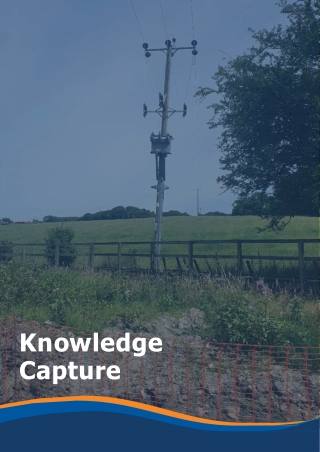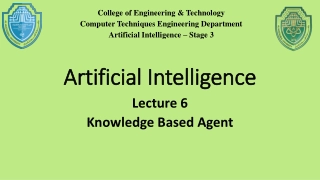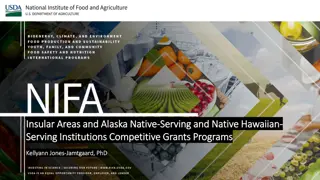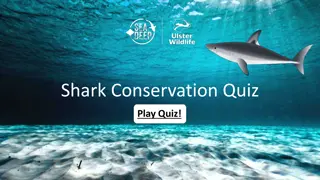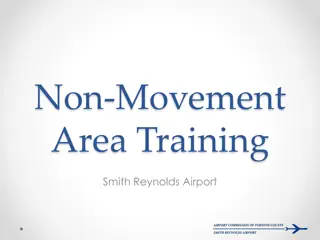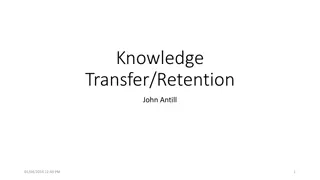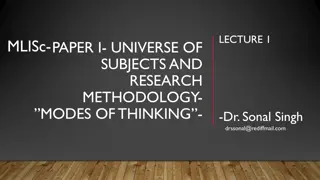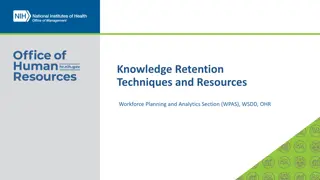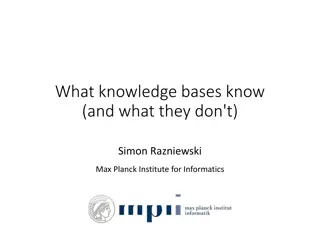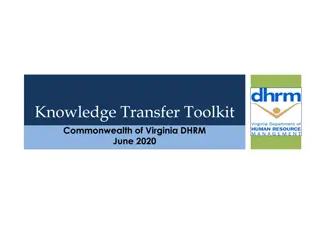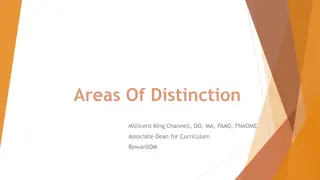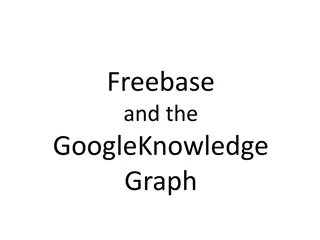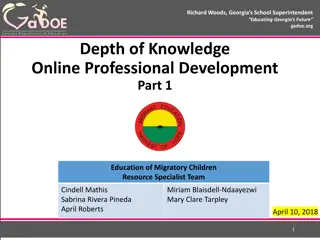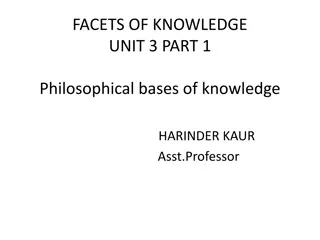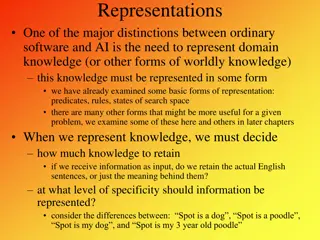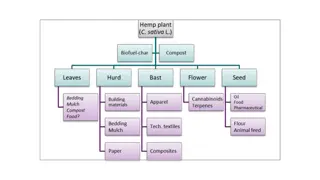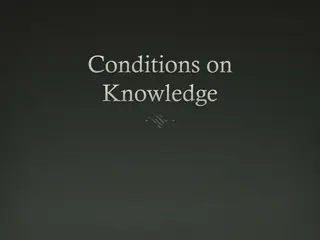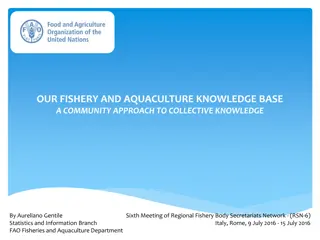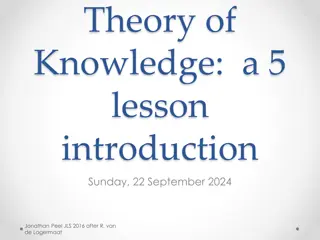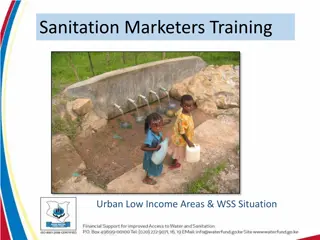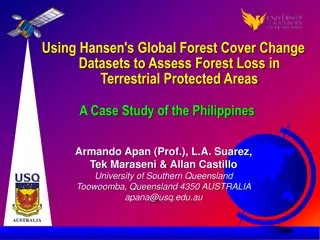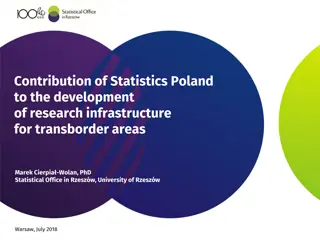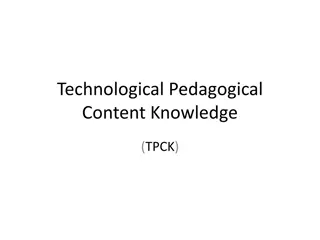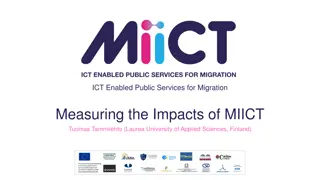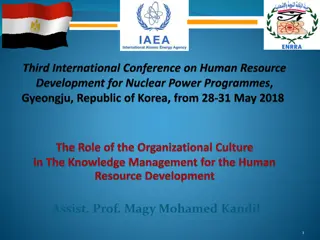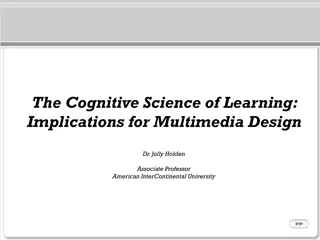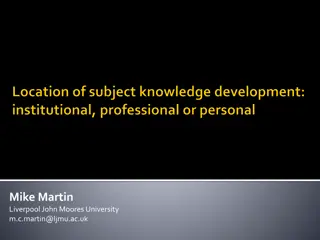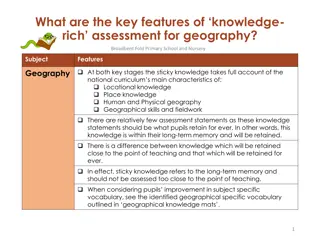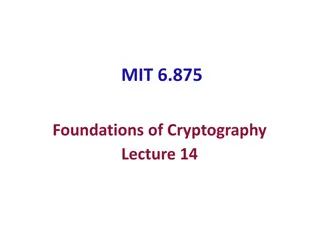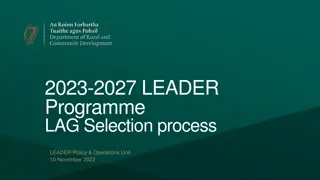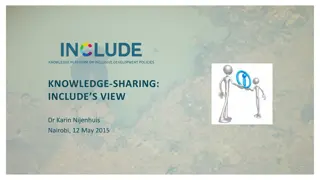Knowledge Capture
Knowledge capture is crucial for organizations to retain valuable expertise and prevent loss of critical knowledge due to employee turnover. Tacit and explicit knowledge play key roles, requiring strategic planning for retention, incentivizing knowledge-sharing culture, and implementing effective st
0 views • 6 slides
Exploring Product and Knowledge Graphs for Enhanced Information Retrieval
Dive into the world of product and knowledge graphs, uncovering the journey to a rich product graph, examples of knowledge graphs for songs, and the mission to provide comprehensive information on products and related knowledge. Discover use cases ranging from information provision to enhancing sear
3 views • 76 slides
Understanding Knowledge-Based Agents in Artificial Intelligence
Knowledge-Based Agents in AI utilize logic and knowledge representation to accept tasks, learn, and adapt to changing environments. Logic plays a crucial role in forming complex world representations and deriving actions based on inference. The central component is the Knowledge Base (KB), represent
3 views • 19 slides
Understanding Knowledge Management: Processes and Frameworks 2. In knowledge management, organizations create, share, and manage knowledge to enhance performance. It involves acquiring different types of knowledge through various means, such as perc
Knowledge Management, Organizational Objectives, Types of Knowledge, Tacit Knowledge, Explicit Knowledge
1 views • 17 slides
Understanding Critical Areas in Washington State: Planning, Designation, and Protection
Critical areas in Washington State, including wetlands, aquifer recharge areas, fish and wildlife habitats, frequently flooded areas, and geologically hazardous areas, are defined and protected to safeguard important ecological functions and values. The designation and protection of these areas invo
6 views • 21 slides
NIFA Competitive Programs for Insular Areas
NIFA provides competitive grant programs to support agricultural research, education, and extension in insular areas. These programs cover a wide range of topics, including advanced technologies, food science, animals, environment, international engagement, and human sciences. Eligible institutions
4 views • 13 slides
Pedagogical Shift in Physical Science: Constructing Knowledge Through Learner-Centered Experiences
There is a significant pedagogical shift in physical science education from viewing science as a fixed body of knowledge to emphasizing the process of constructing knowledge. Learners are now placed at the center stage, engaging in inquiry-based learning, critical thinking, and collaborative interac
3 views • 21 slides
Shark Conservation Quiz Play - Test Your Knowledge on Protecting Shark Populations
Test your knowledge on shark conservation by playing this quiz. Learn about the main ways to protect shark populations, including Marine Protected Areas (MPAs) and fisheries regulations. Discover the significance of Marine Protect Areas (MPAs) and the importance of data collection in species protect
0 views • 26 slides
Establishing Safety Standards in Non-Movement Areas at Smith Reynolds Airport
This guide outlines the purpose, definitions, rules, and safety measures for operating vehicles in non-movement areas at Smith Reynolds Airport. It emphasizes standardized ground movement practices to ensure the safety of airport patrons, reduce the risk of injury, and maintain a high level of safet
1 views • 12 slides
Importance of Knowledge Retention in Organizations
Organizations face negative impacts on performance due to the loss of knowledge. Strategies such as exit interviews, mentorship, and knowledge sharing tools are vital for effective knowledge retention. Assessing knowledge retention maturity through various techniques is crucial, aligning with ISO st
0 views • 11 slides
Understanding Modes of Thinking and Knowledge Development
Man's acquisition of knowledge is intricately linked to his ability to think, reason, and perceive. Knowledge is a result of experiences gained through perception, intellect, and intuition. The history of humanity is a story of knowledge acquisition and development, with man at the forefront as the
1 views • 18 slides
Effective Knowledge Retention Strategies in Workforce Planning and Analytics
Retaining knowledge is crucial for organizations to enhance customer service, foster innovation, improve efficiency, and bridge skill gaps. This article explores the significance of knowledge retention, the types of knowledge essential for succession planning, and two effective strategies - the Know
0 views • 10 slides
Exploring Knowledge Base Construction and Commonsense Knowledge in Fiction
Delve into innovative research interests focusing on knowledge base construction using fictional texts as archetypes, taxonomies for constructing knowledge bases, and extraction of commonsense knowledge from diverse sources. Challenges such as sparsity and semantics are addressed through comprehensi
3 views • 48 slides
Knowledge Transfer Toolkit for Organizational Success
This toolkit, developed by the Commonwealth of Virginia DHRM in June 2020, covers the essentials of knowledge transfer, including its definition, impact, challenges, and management strategies. It emphasizes aligning knowledge transfer with strategic goals, overcoming barriers through leadership supp
2 views • 15 slides
Areas of Distinction in Medical Education at RowanSOM
Areas of Distinction (AoDs) at RowanSOM are specialized curricular components that enhance a student's education and competence in various disciplines. These areas of interest do not appear on transcripts but are recognized in residency applications. Students must demonstrate dedication by completin
0 views • 13 slides
District Metered Areas: Creation and Management Overview
District Metered Areas (DMAs) are essential for NRW management in water distribution networks. By isolating and monitoring specific zones, NRW levels can be analyzed effectively, leading to quicker results and reduced costs. Criteria for DMA creation include network knowledge, NRW areas, size consid
0 views • 12 slides
Evolution of Freebase and the Google Knowledge Graph
Freebase was initially created in 2005 as an open shared database of knowledge, later acquired by Google and absorbed into the Google Knowledge Graph. Its approach included crowdsourcing updates and additions, focusing on data rather than text. The schema of Freebase included around 1500 types, 3500
1 views • 12 slides
Understanding Depth of Knowledge in Education
Exploring Depth of Knowledge (DOK) as a key concept in education, this content delves into how DOK can enhance student engagement and critical thinking skills. Richard Woods, Georgia's School Superintendent, provides insights on applying DOK across different grade levels and content areas, emphasizi
0 views • 19 slides
Facets of Knowledge: Exploring Philosophical Bases and Types
Delve into the philosophical foundations and types of knowledge with insights on local and universal knowledge, theoretical and practical aspects, and school versus out-of-school knowledge. Understand how facets contribute to extended knowledge about attributes within different frames.
0 views • 10 slides
Understanding Knowledge Representation in Artificial Intelligence
In AI, representing domain knowledge is crucial and comes in various forms like predicates, rules, and search space states. Deciding the level of specificity and form of representation is key. Knowledge can be categorized into procedural, domain, and common sense knowledge, available in forms such a
2 views • 32 slides
Insights into Global Hemp Crop Areas and Production Trends
Explore data on hemp crop areas and production trends worldwide, excluding North America. The visual representation showcases the distribution of hemp cultivation areas, production percentages by country, Australian industrial hemp production areas, product yields per hectare, and world natural fibe
0 views • 6 slides
Exploring Epistemology: Understanding Knowledge and Truth
Epistemology delves into the nature of knowledge, understanding, wisdom, and justification, questioning the extent of human knowledge and the different kinds of knowledge. It explores skepticism and conditions on propositional knowledge, discussing whether knowledge implies truth and the debate betw
1 views • 54 slides
Navigating the World of Big Data, Knowledge, and Crowdsourcing
The world has evolved into a data-centric landscape where managing massive amounts of data requires the convergence of big data, big knowledge, and big crowd technologies. This transformation necessitates the utilization of domain knowledge, building knowledge bases, and integrating human input thro
1 views • 5 slides
Polar Curves: Intersections, Areas, and Calculating Enclosed Areas
Explore polar curves, their intersections, areas enclosed by curves, and calculating enclosed areas using given equations. Learn to sketch graphs, find points of intersection, polar coordinates, and apply formulas for finding enclosed areas with examples provided.
0 views • 21 slides
Enhancing Fisheries and Aquaculture Knowledge for Sustainable Development
The Fishery and Aquaculture Knowledge Base, presented at the Sixth Meeting of Regional Fishery Body Secretariats Network, focuses on collective knowledge exchange in the fisheries and aquaculture sector. This knowledge hub offers a wealth of information on various aspects, supporting Sustainable Dev
0 views • 13 slides
Exploring the Nature of Knowledge in Theory of Knowledge
Delve into the essence of knowledge with Jonathan Peel's introduction to Theory of Knowledge, pondering on how different disciplines perceive knowledge, the impact of empirical questioning, and timeless wisdom on ignorance and progress. Explore the concept of basic knowledge and its implications, in
0 views • 37 slides
National Priorities for Climate Change Science and Knowledge in Canada
Canadians are experiencing firsthand the impacts of climate change, including wildfires, heatwaves, floods, hurricanes, and droughts. To address these challenges, foundational climate change science and knowledge are essential for understanding our changing environment, identifying impacts, making i
0 views • 9 slides
Target Areas for Sanitation Marketers Training in Urban Low-Income Areas
Target areas for sanitation marketers training in urban low-income areas include informal settlements, planned urban areas with low-income housing, informal housing in planned residential areas, urban IDP settlements, and urban sub-centers. These areas present challenges with water supply and sanita
0 views • 18 slides
Understanding Modelling Knowledge and Knowledge Representation
Explore the significance of modelling knowledge through knowledge representation, making it explicit, independent, and reusable. Learn why knowledge representation is essential and how it facilitates exchange, query, inference, and visualization. Delve into examples of knowledge application in vario
0 views • 30 slides
Assessing Forest Loss in Protected Areas: A Philippines Case Study
The study assesses forest cover loss in terrestrial protected areas of the Philippines, analyzing the extent and rate of deforestation using Hansen's Global Forest Cover Change datasets. The research aims to understand the drivers of deforestation in protected areas, comparing forest loss in the ent
0 views • 24 slides
Development of Research Infrastructure for Transborder Areas in Poland
Poland's contribution to the development of research infrastructure for transborder areas is highlighted in this presentation by Marek Cierpia-Wolan, PhD. The focus is on creating a coherent research system, delimiting transborder areas, monitoring socio-economic phenomena, and identifying data sour
0 views • 37 slides
Understanding Technological Pedagogical Content Knowledge (TPCK)
Technological Pedagogical Content Knowledge (TPCK) is a framework developed by Punya Mishra and Matthew J. Koehler that integrates content, pedagogy, and technology for effective teaching. TPCK emphasizes the interaction between these three key components to enhance technology integration in educati
0 views • 55 slides
Impact Areas and Measurement of ICT-Enabled Public Services for Migration
This content discusses the impact areas of ICT-enabled public services for migration, highlighting the desired impacts such as employment, accommodation, health, social integration, and more. It delves into how these impacts are measured using questionnaires and estimation techniques. Specific focus
0 views • 11 slides
Enhancing Human Resource Development through Knowledge Management
Monitoring and improving human performance in nuclear facilities is a key challenge, with knowledge management playing a crucial role in increasing staff competence. Organizational culture influences knowledge-sharing success. Explore the components of knowledge management, its importance in nuclear
0 views • 17 slides
The Cognitive Science of Learning: Implications for Multimedia Design
Cognitive science is the interdisciplinary study of human intelligence, involving fields such as philosophy, psychology, artificial intelligence, neuroscience, linguistics, and anthropology. It aims to understand human knowledge, how it is acquired and processed, and its various forms. This field ex
0 views • 45 slides
Understanding Subject Knowledge Development in Education
Exploring the complexities of subject knowledge development in education, this study delves into areas such as students' existing knowledge, competencies, and the role of institutions in shaping knowledge acquisition. The focus lies on personalizing knowledge to individual needs rather than a fixed
1 views • 22 slides
Key Features of Knowledge-Rich Assessment in Geography at Broadbent Fold Primary School
Broadbent Fold Primary School emphasizes sticky knowledge in geography assessment focusing on locational knowledge, place knowledge, human and physical geography, and geographical skills. Assessment statements aim to facilitate long-term retention of knowledge, vocabulary acquisition, and fieldwork
0 views • 8 slides
Zero-Knowledge Proofs in Cryptography
Exploring zero-knowledge proofs in cryptography, this content delves into interactive protocols, perfect zero-knowledge definitions, and the QR protocol's honest verifier and malicious verifier zero-knowledge theorems. It discusses how simulators work to maintain zero-knowledge properties and the si
0 views • 37 slides
Understanding LEADER Programme and Sub-Regional Areas in Ireland
LEADER Programme in Ireland is a key element of the Rural Development Policy 2021-2025, focusing on bottom-up, community-led approaches for rural development. It is delivered across 28 sub-regional areas, excluding main cities, through Local Action Groups implementing Local Development Strategies. S
0 views • 16 slides
Knowledge Sharing and Inclusive Development Policies
Knowledge Platform on Inclusive Development Policies (INCLUDE) focuses on enhancing research utilization in policy-making to foster more inclusive development. It was established in 2012 with the aim of bridging the gap between research and policy processes in African countries. INCLUDE engages expe
0 views • 8 slides
